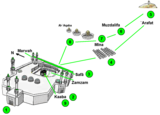| Part of a series on |
| Islamic jurisprudence (fiqh) |
|---|
 |
| Islamic studies |
Ihram (Arabic: إِحْرَام, romanized: iḥrām, from the Semitic root Ḥ-R-M) is a sacred state which a Muslim must enter to perform the Ḥajj (major pilgrimage) or ʿUmrah (minor pilgrimage) in Islam. A pilgrim must enter into this state before crossing the pilgrimage boundary known as the Miqat by performing the cleansing rituals and wearing the prescribed Ihram clothing.
Restrictions
Wearing
A man in the state of ihram must not tie knots or wear stitched items. Sandals and flip-flops may be stitched, but they should allow the ankle and back of the foot to be exposed (some other schools of thought also agree that the front of the foot must be shown as well).
In the state of ihram, men are not allowed to cover their heads or parts of it with a cloth or headwear.[1]
In the state of ihram, women and men are prohibited from wearing gloves.[1]
Scents
While in the state of ihram, a Muslim must not use any scents on the body or the robes. If the robe has been fouled by najas (نَجَس, dirty) material or has been wiped, rubbed or touched by scented liquids (intentionally), then a new iḥrām clothing must be worn, or the Umrah or Hajj will be invalid.
Self-grooming
Aside from being as clean (purified) as they are for prayer, male Muslims are expected to cut their nails, and trim their hair and beards. They must also wear deodorant. They have to wear ihram clothing, which is a white, seamless garment. Many also shave their head as this is considered hygienic. Most will wait to shave their heads until after they have finished Umrah or Hajj, as this is a requirement to leave the state of ihram. Female Muslims are also expected to be clean. During the pilgrimage, sexual activity, smoking, and swearing are also forbidden.[2]
Environment

It is forbidden for every pilgrim of Hajj and Umrah when in ihram to uproot, cut, break, or grind the branches of living trees in the Haramayn, the Two Sacred Places. These are Mecca and Medina (now in Saudi Arabia, and including the Masjid al-Haram, Mount Arafat, Muzdalifah, and Mina) and al-Aqsa (the region on top of the Temple Mount in Jerusalem). This is because the trees that thrive in the Haramayn are blessed.
It is forbidden for every person in ihram to hunt, shoot, kill, sacrifice, capture, confine, destroy or abuse any animal. This prohibition applies to all land animals, birds, and insects other than marine animals.
If a person accidentally steps on or kills small animals or insects, such as small black ants, grasshoppers, etc., he is not considered guilty, but he must pay a fine according to the value of the insects killed.
A person can kill animals and insects that may harm them or other pilgrims, such as mosquitoes, snakes, scorpions, and spiders. However, driving away the insect or animal first is preferable if possible.
When flying

When flying on pilgrimage, appropriate measures are usually taken to assure that the pilgrim will be in the state of ihram when flying above or alongside the stations of the Miqat.[3] For this reason some airports in Muslim areas have dedicated ihram rooms where pilgrims can change into the necessary clothing. If flying with an airline originating from a Muslim-majority country, airline staff will announce passengers should enter ihram.
See also
References
- ^ a b Ibadat haji umrah dan ziarah (in Malay). Lembaga Tabung Haji. 2002. ISBN 978-983-2819-06-6.
- ^ "Ihram". hajjumrahplanner.com. 22 November 2016.
- ^ al-Ghazali, Salih. "The point of Ihram for air travelers". The message of Islam. Archived from the original on 2016-08-11.
External links
- The Five Pillars of Islam, Hajj (Pilgrimage), The Fifth Pillar of Islam, Holy Sites/Mistakes of Pilgrims - An article on the many different beliefs surrounding the wearing of ihram by Sheikh Dr. Ghanim Saleh Al-Sadlan, professor of Higher Islamic Studies at the Imam Muhammad bin Saud Islamic University.
- Ihram Encyclopædia Britannica online
- ^ "Knowledge Corner". Pilgrim Knowledge. Retrieved 2021-10-24.









